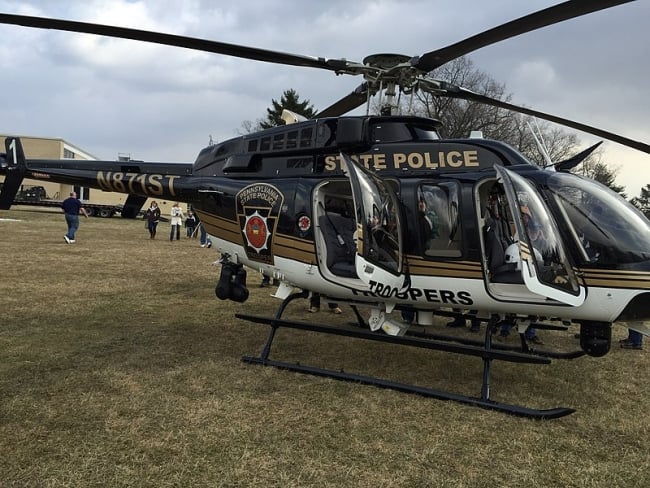You have /5 articles left.
Sign up for a free account or log in.

A Pennsylvania State Police helicopter
Wikimedia Commons
Saturday’s Penn State versus Ohio State University football game blew. Literally.
Tailgaters at Pennsylvania State University’s home game were allegedly getting rowdy, Pennsylvania State police reported. “Unruly individuals” had ignored commands, according to a campus police statement -- one man was arrested and charged with striking a police horse and for disorderly conduct, among other offenses. A state trooper broke his wrist.
So state police sent in a helicopter to break up the party.
Video posted online shows the copter swooping in above the cars, flying above the throng of tailgating fans in white jerseys. Bystanders revel at the helicopter until it dips, and footage reveals winds so powerful that grills, tents, wooden cornhole game sets and other items were lifted and sent flying, as in The Wizard of Oz. Police statements have not said how low the helicopter went.
Videos recorded by people on the ground reveal chaos -- many in the crowd ducked and swerved to avoid the debris, and others were knocked to the ground.
“It is rare to resort to these expanded interventions,” Penn State police said in a statement. “However, when all other warnings … on the ground were ignored, a Pennsylvania State Police helicopter was deployed as another tool to compel the group to disperse and curb dangerous and unruly behavior.”
State police said officers were attempting to use a loudspeaker to communicate with the crowd and the pilot pulled back up after objects started flying.
Since Saturday, police have met tempestuous criticism.
Chris Buchignani, one of the hosts of the local TV show Obligatory PSU Pre-Game Show, wrote on Twitter that he hopes the university and President Eric J. Barron “will show leadership” on the “weaponization” of a police helicopter.
“Disproportionate, unacceptable use of force,” he wrote. “Unnecessarily dangerous.”
Penn State announced that temporarily it won’t use helicopters at football games to make announcements. The Federal Aviation Administration confirmed to the Associated Press that it is investigating a complaint but declined to share details. FAA regulations state that pilots should remain at least 1,000 feet above congested areas and must be able to safely land a helicopter without harming people or property in the event of power failure.
Josh Bronson, director of training for the International Association of Campus Law Enforcement Administrators and former deputy police chief at McDaniel College, said he did not want to question Penn State's decision to use the helicopter -- but that in his career he has never seen one called to a tailgate, even when he worked at University of Maryland, College Park, the flagship public university in the state, with the most competitive athletics scene.
Among the most common incidents campus police forces handle are large or out-of-control crowds during sporting events, Bronson said.
Typically, officers will try to talk to “leaders” in the crowd and try to de-escalate and disperse the revelers verbally, but depending on the intensity of the situation, police may use pepper spray or other tactics, Bronson said.
Even at McDaniel, a small, private institution in Maryland, he and his officers would break up fights that would turn into crowds otherwise, especially around homecoming time, he said.
Police often have helicopters waiting in the wings at large-scale events such as the Penn State tailgate, Bronson said. Many campus police forces have mutual aid agreements with other area law enforcement in which they provide helicopters or bomb-sniffing dogs, for instance.
“If you’re securing the games for thousands of fans in one place, you certainly need additional resources,” he said.




